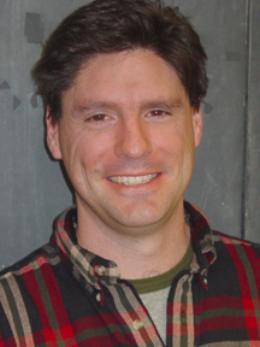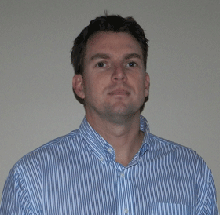Research Faculty
 My research interests focus on fish biology, more specifically, the comparative physiology of fishes. I am particularly interested in the comparison of the morphological, physiological, and biochemical specializations of high-performance fishes (i.e., tunas, billfishes, and lamnid sharks). I am interested in understanding the progression of character-state acquisition leading to the suite of specializations present in these derived high-performance marine fishes and addressing questions on the biological mechanisms that distinguish high-performance fishes from all other fishes.
My research interests focus on fish biology, more specifically, the comparative physiology of fishes. I am particularly interested in the comparison of the morphological, physiological, and biochemical specializations of high-performance fishes (i.e., tunas, billfishes, and lamnid sharks). I am interested in understanding the progression of character-state acquisition leading to the suite of specializations present in these derived high-performance marine fishes and addressing questions on the biological mechanisms that distinguish high-performance fishes from all other fishes.
See Dr. Bernal's faculty profile for contact and more information.
 My research interests are in broad areas of comparative immunology, but there is an emphasis in my laboratory on antibody mediated protection. Antibodies are proteins responsible for antigen (pathogen) recognition, leading to neutralization and eventual destruction of the pathogen. The highly polymorphic nature of the antibody binding domain allows them to recognize billions of different pathogens. My laboratory focuses on the structure of the antibody, the cells responsible for antibody production, and the quality of the antibody for pathogen recognition.
My research interests are in broad areas of comparative immunology, but there is an emphasis in my laboratory on antibody mediated protection. Antibodies are proteins responsible for antigen (pathogen) recognition, leading to neutralization and eventual destruction of the pathogen. The highly polymorphic nature of the antibody binding domain allows them to recognize billions of different pathogens. My laboratory focuses on the structure of the antibody, the cells responsible for antibody production, and the quality of the antibody for pathogen recognition.
See Dr. Bromage's faculty profile for contact and more information.
For the past 30 years I have worked on a unique population of Indian Ocean bottlenose dolphins (Tursiops aduncus) in Shark Bay, Western Australia. Most of my work has focused on alliances formed by adult males in competition over estrus females. These alliances are remarkable for their complexity. The males form three levels of nested alliances, a phenomenon that has no match outside of our own species. Our findings have important implications for current thinking about the role complex social relationships had in the evolution of large brain size and intelligence in mammals. We are working on over 100 adult males in the population and are launching a fully integrated study that examines alliance formation from multiple perspectives, including communication, cognition, genetics, ecology, and development.
In addition to working in Shark Bay, my graduate students have worked on dolphins and whales in a variety of locations in the US, Central America, the Caribbean and India, exploring a range of questions focused on behavior and ecology.
I also have a long-standing interest in theory, especially on the evolution of cooperation, altruism and mutualism and the evolution of social systems.
See Dr. Connor's faculty profile for contact and more information.
My research integrates genomic and quantitative genetic approaches to investigate variation among populations, primarily behavioral and physiological adaptations in fish. Fishes are the most diverse group of vertebrates, and species have adapted to very different, often extreme environmental conditions. Projects in my laboratory combine genomics, quantitative genetics, and linkage analysis to investigate the genetic variation and physiological mechanisms underlying innovative adaptations.
In the long term, I am particularly interested in the following questions:
- What are the molecular mechanisms underlying these adaptations and how do they function?
- Are the same genes or pathways responsible for convergent adaptations in different species?
- Are suites of traits that co-evolve genetically co-regulated?
See Dr. Drew's faculty profile for contact and more information.
I am essentially a comparative vertebrate embryologist, with broad interests in ecological and evolutionary questions. My current research aims to test whether processes during organ development can bias the production of variation (the phenotypes that are available for natural selection in a population) and thereby influence evolutionary patterns. I work on organ-systems with repeated elements that can vary in size; organs such as teeth or finger bones form in sequence from a single initial condensation, and, among species, there is significant variation in sizes. To test ideas and advance theory in this area, I employ methods from experimental embryology, comparative anatomy, developmental genetics, and computational modeling.
I also have a great interest in observing evolutionary and developmental processes in situ, that is, in nature and in response to ecological variation, and thus I study “natural evolutionary experiments” on populations of fishes. In these studies, I am focusing on interactions of developmental temperature and evolution of growth rates and tissue differentiation rates.
I welcome students and postdoctoral researchers who are interested in these research questions to contact me.
See Dr. Kavanagh's faculty profile for contact and more information.
Marine microbial ecology, diversity, distributions, and activity of marine microbes contributing to nitrogen fixation, and other microbially mediated transformations of nitrogen.
Ecology of toxin-producing cyanobacteria, cyanobacterial blooms.
See Dr. Moisander's faculty profile for contact and more information.
My research interest covers a comprehensive array of topics pertaining to the biology of fishes with an emphasis on the biology of American eels. The American eel is found in every aquatic habitat type in eastern North America. It has a long and complex life history that provides an interesting model for studying life history strategies, sex determination, pollution effects, and other ecologically important issues. Current eel projects in my laboratory include: examinations of the distribution and physiological effects of the recently introduced swimbladder parasite, Changes in the digestive system during the adult metamorphosis, sex determination, effects of contaminants on gametogenesis, and the development of artificial fertilization methods (in collaboration with Dr. Whitney Hable's laboratory). In addition, my graduate students have often provided inspiration for research on other species and numerous non-eel projects have been and continue to be developed in my laboratory.
See Dr. Oliveira's faculty profile for contact and more information.
My research investigates the mechanisms that determine species diversity and composition in plant communities. I use novel analytical approaches to separate the effects of factors such as species pools, dispersal, resource stress, and competition on community structure. This work takes advantage of existing large datasets. I also use greenhouse and field experiments to examine the strategies plants use to compete for patchy belowground resources, and the effects of that competition on community structure.
See Dr. Rajaniemi's faculty profile for contact and more information.
My research interests are in microbial activities in natural environments such as soil. Most of what we know about bacteria has been discovered using laboratory cultures of single species. Unlike traditional laboratory conditions, in complex environments such as soil bacteria need to respond to fluctuating environmental parameters, and must interact with a large number of other microbial species. We have found that in the presence of multiple bacterial species and while dwelling in soil, bacteria behave in ways which have never been observed in laboratory culture experiments.
See Dr. Silby's faculty profile for contact and more information.
Long-term plankton and water-quality ecological survey of Buzzards Bay; plankton communities of Boston Harbor and adjacent waters; zooplankton feeding; food web accumulation and transport of red tide toxins; interactions between copepod feeding and reproductive success.
See Dr. Turner's faculty profile for contact and more information.
